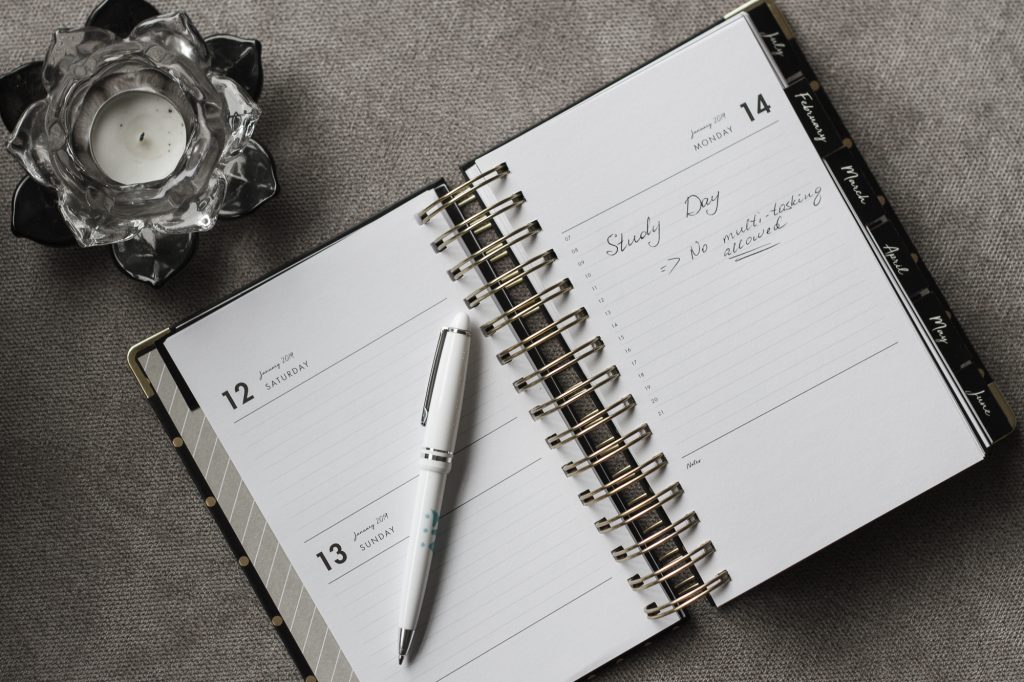First of all, Happy New Year! I am aware that we are 9 days into 2019, but I haven’t yet had a chance to say this.
May the stars align and all your dreams and plans become reality in 2019!
But since we are a bit more into science than reading the star charts, we should know that luck is merely an occurrence of particular events at particular time that suddenly works for us. But to make these things occur in the first place, we need to act. You won’t get lucky if you sit at home and watch TV, right?
That’s why we set goals, we plan our actions, we make schedules and we follow them for better productivity. But sometimes it doesn’t quite work and you find yourself distracted. There are so many things to do and so little time, and your mind simply can’t stop racing. Does it sound familiar? Yes? Then this little tweak in your schedule may change your life forever. Stay with me to learn more.
The Fall of Multi-Tasking

Have you ever had days where you felt so consumed with one single thing that you forgot about everything else? Say, you started learning a new language and it was so exciting that you spent the entire day with the book? Or take the example of binge-watching a TV show, which is not a good example of a desired progress, but of a progress, nonetheless. Or maybe it was something less pleasurable, like you had to study for an exam and prioritized it over all other tasks. I think it’s safe to say that if you spent the entire day working on something – on one particular task, you had accomplished something, you’d had a good progress.
Now, imagine that time you spent on that particular task divided between several days, if not weeks, or months. How much would you accomplish in a single day if you only had one hour a day to work on it? How long would it take you to get to the same level as one full day of single-tasking?
Another way to look at this is school or college. You can do a course stretched over a few months, if not years. Or you can get an intensive 1, 2 or 3-day training. Of course, we are not talking about bachelor degrees that take years of daily studies, but I hope you get the picture.
This single-tasking method works not only by letting you spend a bigger chunk of time on it at once and get to completion much sooner, it also works perfect due to the way your brain is wired. It is easier to focus on a task if you know that it is the only important task in your schedule and you don’t have to hurry up in order to finish it in a tight time frame and have the time left for something else. It removes the root of so many distractions. Your brain gets a clear picture: your task today is to do THIS. And it does it.
Single and Batch-Tasking Revolution

Now it’s time to see how it works in practice. There is a number of successful entrepreneurs, including the billionaire founder of Spanx, Sara Blakely, who follow this method and say it has revolutionized their business, life and productivity. Instead of creating tight daily schedules by breaking their days into hours, they break their weeks into days and either single- or batch-task on one particular day.
For example, Sara Blakely tells Inc.com that she uses Mondays as her “think days” and Wednesdays are for meetings. Other entrepreneurs talk about collaborating all the creative work into one day, according to Inc.com.
And even if we forget the entrepreneurs and look at homemakers, some of them would swear by setting one day a week aside for house cleaning and one for batch-cooking. That way you don’t have to do a lot of cleaning or cooking everyday – what you need is just a daily touch up and simple meal prep. But it is so much easier if you know that you don’t have to bother with these two time-consuming tasks until the days you’ve set for them. On the other hand, when that day arrives, your brain knows that it’s your only task for today, or a batch of similar tasks, and you don’t spend extra time on thinking about your next task or switching between tasks.
Psychologists are sure that switching from one task to another confuses your brain and decreases your cognitive function. In fact, up to 40% of your productivity may be lost due to multi-tasking, according to American Psychological Association report.
Will This Work For You?
It probably depends on your work specifics, but you will only find out by giving it a try.
I’ve decided to try it out myself before writing this article and so far I think it has been great.
I declared Monday my ‘study day’ and spent the entire day finishing reading the college papers from Dec 11th (!!!) and writing my assignment. I’ve written 600 words, roughly 1/3 of my assignment, and I can tell you that this is far more than I have done in the past month, even though the assignment has been in my schedule among other things every day for the past month. Yet, I simply couldn’t concentrate on it in the hour or two that I’ve been dedicating to it. I hope to finish it next Monday – at least there will be no more papers to read.
Tuesday was set for sorting my photo library. There was a lot of photographs to back up and a lot to edit. I’ve backed up everything I could, edited 50% of the photographs I’ve been collecting since the summer and freed up almost 100 GB of space on my desktop that has been screaming “Clean me up!” for months. I’ll have another study day tomorrow for my Life Coach diploma, and today was another Photo Day as I recently came back home after a photo shoot.
I will see how I can plan the following days, I don’t feel like they should follow a strict pattern. Being fluid and adaptable is a great skill to learn.
Final Advice
Start easy
It may be hard to dive in to this new way of scheduling things, especially if you have a very busy life. So ease yourself in by first inspecting your existing schedule to see which things you can batch together. It’s ok if you can’t dedicate the entire day to one single task. Make sure you start with the most important task though and allow yourself plenty of time to do them. Try to plan no more than 2 or 3 tasks for one day, and see how you go from there. You may later add small tasks to finish the day off once you are happy with the work you’ve done.
Allow flexibility
As I have said earlier, it doesn’t have to be a strict schedule and your tasks may vary from week to week. Life lacks constancy, it flows in many different shapes and brings things up when you least expect them. Allow for some flexibility whenever you can, it will make your life much easier. Prioritize tasks by the matter of importance.
Don’t forget free time
Leave some blocks of time or the entire day schedule-free. Go for a walk or exercise, meet up with friends or simply have some rest. Quiet, unoccupied time fosters creativity and may actually boost your productivity even further.
Now, I hope this helps!



4 Comments
Gracia Harrison · January 19, 2019 at 3:42 AM
Wow! This was truly an interesting read; I’m going to try this! I get so overwhelmed trying to do ALL THE THINGS at once. Hopefully this helps! Thanks for the read!
Lana · January 19, 2019 at 10:04 PM
Thank you for reading! Hope it helps, it did help me to breeze through my major tasks that I couldn’t finish in months!
Jacinta Grand · January 19, 2019 at 5:54 PM
I’m a big fan of batch tasking! I’ll often set a timer when I’m tackling a task so I don’t get distracted while I’m working on something.
Lana · January 19, 2019 at 10:00 PM
I love using timers too. I even often feel a bit disappointed when the timer goes off and I know it’s time to take a break 😀